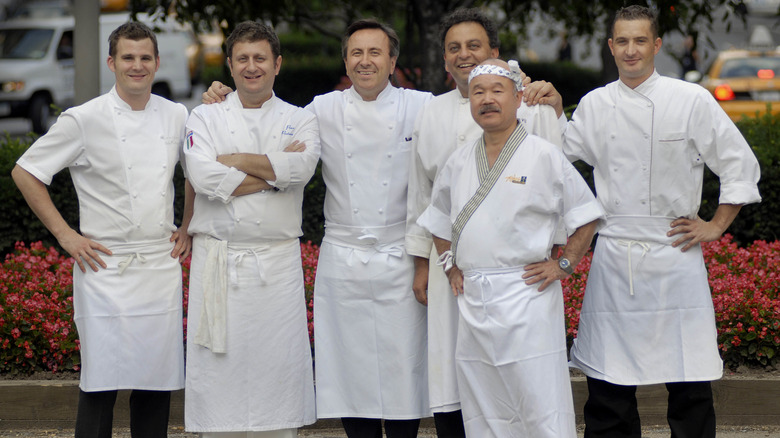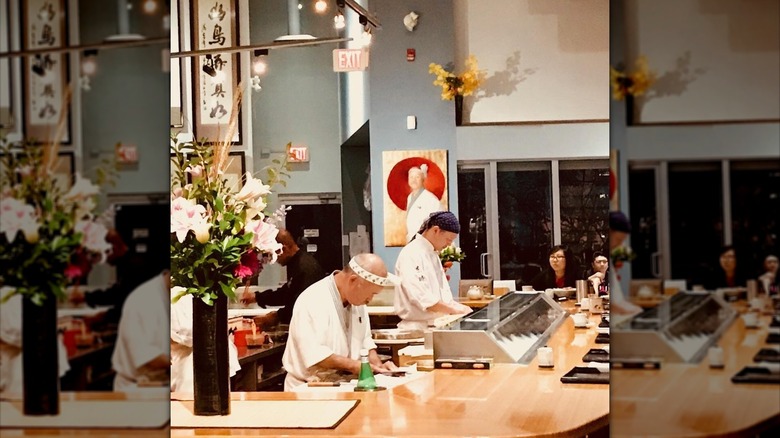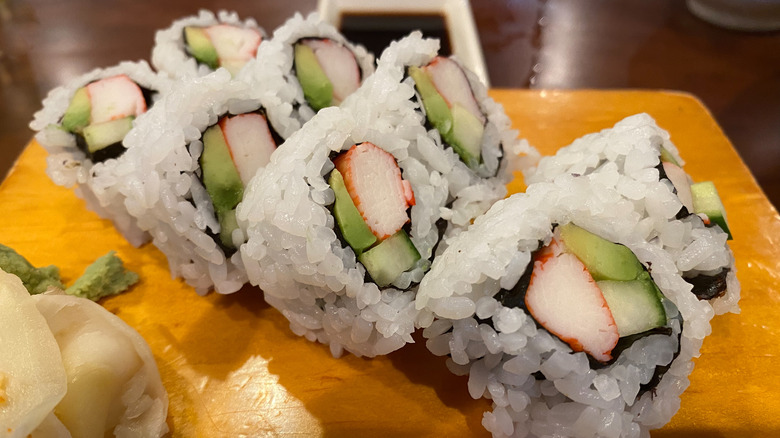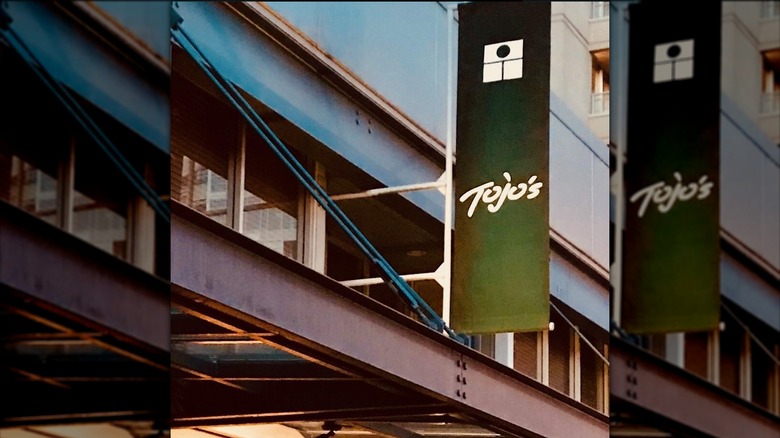The Restaurant In Canada Where You Can Eat A California Roll From The Chef Who Created It
Was the California roll actually invented in Canada? Some foodies certainly think so. Anytime you get a group together to discuss a popular dish with a fuzzy origin, there will always be differing opinions about who first improvised the recipe. In the case of the California roll, one sushi chef with an abiding claim to being the inventor of the dish is Hidekazu Tojo, the owner of Tojo's Restaurant in Vancouver, British Columbia, Canada.
When Montecristo Magazine profiled Tojo in 2017, it detailed how he migrated from Osaka to Vancouver in 1971. Osaka has some of the best food in Japan (the city is known as the nation's kitchen), and Tojo found the food scene infused with a strain of open-mindedness and creativity, in contrast with more traditional, buttoned-up attitudes in Tokyo. Back in his hometown in Kagoshima Prefecture, he had been left to fend for himself in the kitchen since he wanted meat, but his parents only ate fish and chicken. Ultimately, his background in both places helped prepare him for the Canadian restaurant market, where he adapted by turning the conventional sushi and seaweed wrap inside-out.
As its name suggests, the California roll — or "Vancouver sushi," or the "inside-out roll," as Tojo once called it — is a quintessential fusion food. You won't find it served in most sushi restaurants in Japan. According to the book, "American Tuna: The Rise and Fall of an Improbable Food," the earliest-known stateside references to the California roll are bicoastal, popping up in print newspapers like The Los Angeles Times and The Palm Beach Post in November 1979.
Omakase is the way to go at Tojo's Restaurant
Today, Tojo's Restaurant is one of those Vancouver places where you might spot celebrities. Over the years, its customers have run the gamut from pop stars to politicians, from Justin Timberlake to Canadian Prime Minister Justin Trudeau. Vancouver is Canada's most filmed city, so you might see some TV and movie stars around. Chef Tojo was friends with the late Anthony Bourdain, and his restaurant appeared on a 2008 episode of Bourdain's popular Travel Channel show, "No Reservations."
In the episode, Bourdain declared, "The smart seats at Tojo's are at the 'omakase' bar, which means literally, "Chef, I am in your hands."" Years later, you can still put yourself in good hands at Tojo's with the Shiawase (or "Happiness") Omakase course. The pricier Yokozuna Omakase course alludes to the Japanese title bestowed upon a sumo grand champion. So, it's a safe bet you're getting more food there to bulk you up for the wrestling ring — or just make your stomach even happier.
There's also a Sushi Bar Omakase course, or you can order straight off the sushi menu. The inside-out roll now goes by the name "Tojo Maki," and it's labeled as a "pioneer of the California Roll," made with crab, avocado, spinach, egg, and sesame seeds. Crucial is the fact that it's Dungeness crab, the Pacific Northwest equivalent of Maine lobster. As Bourdain noted, "Tojo, unlike a lot of transplanted Japanese chefs, relies heavily on what is available locally, rather than getting everything flown in from Tokyo. He celebrates Vancouver's rather extraordinary bounty of fresh seafood and adapts his daily menu possibilities to that."
Sushi for North Americans, with real crab (no imitation)
Framing Tojo as a California roll "pioneer," rather than its sole inventor, is a diplomatic way of circumventing disputes over the dish's origin. In science, there's a phenomenon called convergent evolution, whereby different organisms independently develop similar biological traits as a solution to the same type of environmental problem. It's possible the California roll is simply a culinary case of convergent evolution. More than one Japanese chef in Vancouver and the Golden State could have devised the same inside-out idea as a workaround for picky eaters.
One thing that is generally agreed upon is that sushi spread from Japan to the U.S. in the late 1960s. Even before Tojo went from hired hand to restaurant owner in 1988, he and other chefs faced the problem of making sushi enticing to American and Canadian restaurant patrons, who were less accustomed to consuming raw fish and moist seaweed. The chef told Montecristo Magazine, "I'm a fighter, a big fighter. I think, 'Okay, they don't like seaweed. Maybe hide it.'"
Theoretically, substituting crab meat for raw, sometimes slimy tuna would have also made the dish more suitable for the North American palate. Just don't expect to bite into a California roll with imitation crab substituted for Dungeness crab at Tojo's Restaurant. The chef seems to regard that as a cardinal sin of culinary capitalism, mass-produced for consumption by those with less refined taste in crab. "That is very bad," he said. "I'm a chef. I'm not a businessman. Businesspeople want profit, profit, profit. I like to make real food. Not imitation."
'That's my style, all local'
Tojo's aversion to crass commercialism sets his restaurant apart from others and adds to its local appeal for travelers, as he remains committed to serving quality food in one location. In Tokyo, some Michelin-starred restaurants have gone the franchising route. They've become small global chains or even 7-Eleven or airline food brands, only to lose their stars as the food quality declined at the original location.
On "No Reservations," Tojo expressed a desire to bring out-of-towners to his Vancouver restaurant for an experience they can't get anywhere else. "I like to say, people from out of town, please eat local products," he said. "You know, one time, you only have one chance. That's my style, all local." The à la carte menu at Tojo's does offer premium sashimi imported from Tokyo's Toyosu Fish Market. However, it also assumes knowledge of American pop culture, putting the customer on a first-name basis with Tom Selleck, whose '80s television character — "Magnum, P.I." — has a temaki sushi dish named after him.
Road-trippers could drive almost straight down the interstate from Vancouver to L.A., where other contenders for "California roll inventor" have long since closed their sushi shops. If the restaurant world is survival of the fittest, then Tojo's must be doing something right. Per The Vancouver Sun, its influence has even extended to local fishermen, who no longer subject their catches to ice burn, thanks to Tojo. For his efforts on behalf of sushi diplomacy, the Japanese government has made this Vancouver chef one of a select few Goodwill Ambassadors for Japanese Cuisine worldwide.



